Subject-Verb Agreement
advertisement
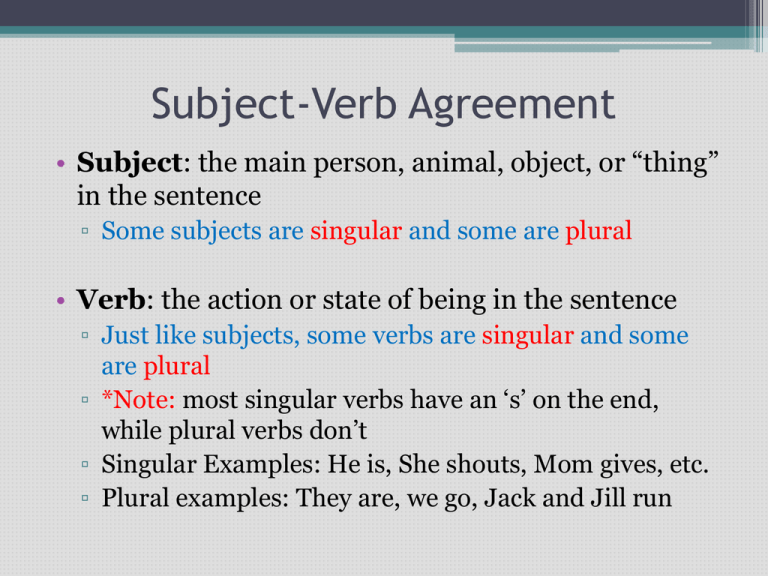
Subject-Verb Agreement • Subject: the main person, animal, object, or “thing” in the sentence ▫ Some subjects are singular and some are plural • Verb: the action or state of being in the sentence ▫ Just like subjects, some verbs are singular and some are plural ▫ *Note: most singular verbs have an ‘s’ on the end, while plural verbs don’t ▫ Singular Examples: He is, She shouts, Mom gives, etc. ▫ Plural examples: They are, we go, Jack and Jill run Subject-Verb Agreement • Subjects and verbs must agree in number. • That means a singular subject must take a singular verb while a plural subject must take a plural verb. • Examples: ▫ ▫ ▫ ▫ The motor is running. The motors are running. The girl has been delayed. The girls have been delayed. Subject-Verb Agreement • Circle the appropriate verb, then label the subject and verb as singular or plural. 1. This museum (has, have) been called the best of all in New York City. ____________ 2. The enormous building (cover, covers) three blocks. ____________ 3. The different showrooms (deal, deals) with various art forms. ____________ 4. Some tours (is, are) conducted by actual artists. ____________ Problems with Subject-Verb Agreement • Sometimes there may be a phrase between the subject and the verb. Example: The crystal pitcher, oozing water droplets, was cracked along the base. • When this happens, you must ignore the phrase and make sure the subject and verb match in number. • Does this make sense? ▫ The crystal pitcher was cracked along the base. Problems with Subject-Verb Agreement • Remember prepositional phrases? • What did I tell you about subjects and prepositional phrases? ▫ A prepositional phrase can never contain a subject! • Prepositional phrases often come between a subject and its verb. You must ignore the prepositional phrase to make sure the subject and verb match in number! Example: Books along the far wall of the library (is, are) up for sale. Problems with Subject-Verb Agreement • Underline the subject, cross out the interrupting phrase, then choose the correct verb. 1. A tidal wave, despite its name (is, are) not caused by the tides. 2. A network of warning signals (alert, alerts) people in coastal areas of an approaching tidal wave. 3. The tremendous force of tidal waves sometimes (causes, cause) great destruction. 4. Walls of earth and stone along the shore (is, are) often too weak to protect coastal villages. More Problems with S-V Agreement • An indefinite pronoun is a word that does not refer to anyone or anything specific. • Examples: anybody, anything, everyone, someone, something, nobody, nothing, no one, etc. • Some indefinite pronouns are singular, some are plural ▫ Singular Example: Neither of the movies was funny. ▫ Plural Example: Many of our neighbors keep dogs as pets. • There’s always an exception… • Sometimes you must use the prepositional phrase to determine if the indefinite pronoun is singular or plural. ▫ Example: All of the fruit is ripe. More Problems with S-V Agreement • Use the prepositional phrase to decide if the pronoun needs a singular or plural verb. 1. 2. 3. 4. 5. All of my cousins (live, lives) in New Hampshire. All of my family (live, lives) in New Hampshire. Some of the apples (has, have) been sold. Some of the harvest (has, have) been sold. Most of the neighborhood (is, are) coming to the barbeque. 6. Most of the neighbors (is, are) coming to the barbeque. More Problems with S-V Agreement Singular Plural It Depends… Anybody Anyone Anything Each Either Everybody Everyone Everything Neither No body No one Nothing One Someone Somebody Something Both Few Many Several All Any Most More None Some More Problems with S-V Agreement • Find the indefinite pronoun, decide if it is singular or plural, and choose the correct verb to match the subject. 1. Each of the brothers (study, studies) biology. 2. No one on either team (was, were) ever in a playoff before. 3. Anybody with binoculars (are, is) popular at a large stadium. 4. Both dogs and cats (enjoy, enjoys) treats. 5. None of the dinner (were, was) burnt. 6. None of the players (were, was) hurt in the game. 7. Many people (wish, wishes) to win the lottery! Even More Problems with S-V Agreement! • But this one is relatively easy… • Compound subjects (joined with ‘and’) usually take a plural verb. ▫ Our dog and cat get baths in the summer. ▫ Jack and Jill ran up the hill. • Singular subjects joined by ‘or’ or ‘nor’ take a singular verb. ▫ Neither the professor nor his assistant arrived to class on time. • AND, if you have a singular subject and a plural subject joined by ‘or’ or ‘nor,’ use the subject closest to the verb to determine whether it is singular or plural. ▫ A book or flowers usually make an appropriate gift. ▫ Flowers or a book usually makes an appropriate gift. Even More Problems with S-V Agreement! • Choose the correct verb for each sentence below. 1. Neither pens nor pencils (is, are) needed to mark the ballots. 2. Either my aunt or my uncle (is, are) going to drive us. 3. That table or this chair (was, were) handmade in Portugal. 4. (Has, Have) the sandwiches or other refreshments been served yet? 5. Either Japanese poetry or Greek myths (is, are) going to be the focus of my essay. Seriously? More S-V Agreement Problems? • Yes, there are more. Here are the shortened versions: • Collective nouns (audience, team, collection) take a singular or plural verb depending on the meaning/use of the subject in the sentence. ▫ The class has decided to put on Shakespeare’s Hamlet. ▫ The class were divided on their opinions of who should play the lead role. • Sometimes the verb comes first in the sentence. Make sure the subject and verb still match in number. ▫ In the pond swim large goldfish. ▫ Were you arriving late, too? ▫ There are our new neighbors. Finished!



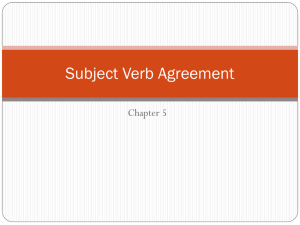







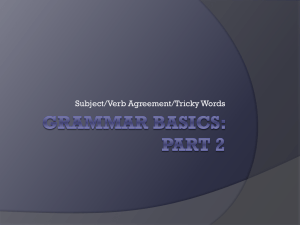

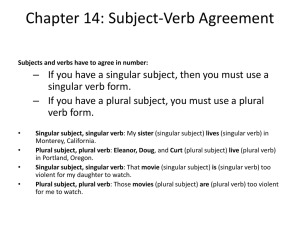

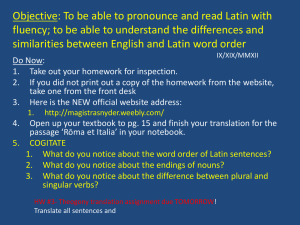



![ACT English PowerPoint[1].ppt](http://s2.studylib.net/store/data/005273503_1-9a791f251d894fae751c69afcf4efc44-300x300.png)

